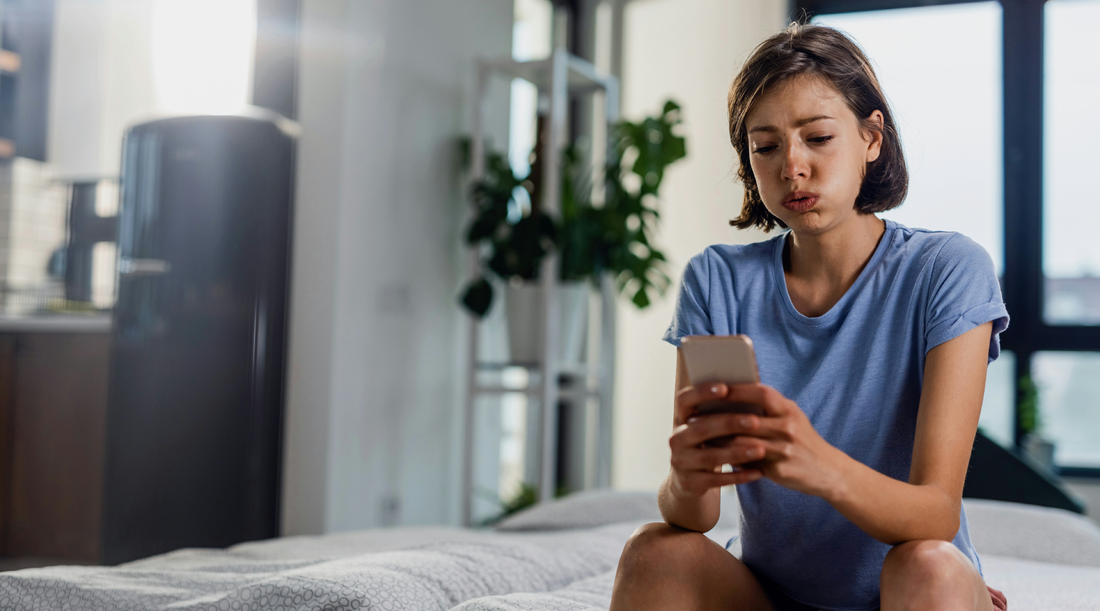
Anxiety Is More Than Just Nerves
Imagine standing in front of a mirror, the clock ticking away, as you try to smooth out every single bump in your hair. To anyone else, it might seem like a trivial concern, but for me, it was a battle—a battle against my own mind, where the stakes felt as high as life and death. This wasn't just about vanity; it was about control, about making something 'perfect' in a world that felt chaotically out of my grasp. Welcome to my introduction to anxiety, long before I knew its name.
What Exactly Is Anxiety?

My Brain Trying To Hold Itself Together Spongebob Brain On Fire GIF [Digital Image]. (2022) from Tenor.com
Your brain has an alarm system, and it's a little too eager. It goes off at the slightest hint of trouble—and sometimes, it's like that one car alarm in the neighborhood that goes off for no reason at all. That's anxiety for you. It's not just the jitters before a big presentation; it's a persistent, often overwhelming sense of dread and fear that can consume your day-to-day life. Talk about making mountains out of molehills.
According to the National Institute of Mental Health, anxiety disorders are the most common mental health concern in the United States, affecting millions of adults each year [1]. But what does it really feel like? Imagine being perpetually on edge, your mind racing with worst-case scenarios over things big and small, from the bumps in your hair to the fear of leaving the stove on.
Symptoms and Signs
Anxiety is like a box of chocolates—a really, really unenjoyable box of chocolates. You never know what you're gonna get. The symptoms of anxiety can be as varied as the individuals who experience them [2]. For me, it was hours lost trying to make my hair look “just right,” a ritual that was more about quelling my inner turmoil than achieving any aesthetic goal.
Physical Manifestations
Anxiety doesn't just mess with your mind; it has a very real, very physical side to it. Here's how it can manifest physically:- Rapid Heartbeat and Palpitations: Feeling like your heart is racing out of your chest, even when you're not moving.
- Sweating: Breaking out in a sweat at the thought of facing your triggers.
- Trembling or Shaking: An uncontrollable response when anxiety hits.
- Fatigue: Despite the racing thoughts, your body feels drained, exhausted from the constant state of alert.
- Headaches and Muscle Tension: Physical stress manifesting as pain, making relaxation seem like a distant dream.
Emotional Symptoms
On the flip side, anxiety's emotional grip can be just as, if not more, paralyzing:- Persistent Worry: About big things, small things, sometimes about nothing at all.
- Restlessness: A feeling of being unable to sit still or relax, constantly on edge.
- Irritability: A short fuse over seemingly minor issues, thanks to the constant pressure.
- Difficulty Concentrating: When your mind is filled with what-ifs, focusing on the task at hand becomes a Herculean task.
- Sleep Problems: Trouble falling asleep or staying asleep, because your mind won't hit the off switch.
The Many Faces of Anxiety
Anxiety doesn't like to be pigeonholed; it's got range, including generalized anxiety disorder, social anxiety disorder, and specific phobias, among others. Each type has its own set of triggers and symptoms, making the experience of anxiety deeply personal [3]. My own battle with obsessive-compulsive disorder (OCD), a condition often intertwined with anxiety, manifested in an obsession with my hair and a compulsive need for perfection in my handwriting.
Generalized Anxiety Disorder (GAD)
GAD is like the background noise of anxiety; it's a constant buzz of worry about everyday things—work, health, relationships—that's out of proportion to the actual risk or impact.
Social Anxiety Disorder
This isn't just shyness. It's an intense fear of social situations, a dread of judgment or embarrassment that can make everyday interactions feel insurmountable.
Panic Disorder
Imagine the worst fear you've ever felt, hitting you like a freight train out of nowhere. That's a panic attack. For those with panic disorder, these attacks are frequent and often unprovoked, making the fear of the next attack part of the cycle.
Obsessive-Compulsive Disorder (OCD)
OCD is a relentless cycle of obsessions (intrusive, unwanted thoughts) and compulsions (behaviors driven by the need to alleviate the distress these thoughts cause).
Post-Traumatic Stress Disorder (PTSD)
PTSD follows in the wake of trauma, a shadow that turns memories into minefields. It's not just reliving the trauma but being in a constant state of fight or flight because of it.
Phobias
Intense, irrational fears of specific things or situations—spiders, heights, flying—that go beyond normal caution and significantly impact your life.
Who's at Risk?
Anxiety's not picky; it'll set up shop in anyone's brain. But genetics, brain chemistry, personality, and life events can roll out the welcome mat for it. For me, it wasn't just about being wired for worry; it was how life's curveballs, like the pandemic, turned my anxiety up to twenty [4].
Finding a Path Through Treatment

There's no one-size-fits-all solution for anxiety, what works for one person may not work for another [5]. Treatment can take many forms, from therapy and medication to self-care strategies like mindfulness and exercise. It took me years to understand that my rituals and worries were symptoms of a larger issue, one that needed professional intervention and personal acceptance.
My Dance with Anxiety
Standing backstage, glittering in my custom-made burlesque costume, I was moments away from facing a crowd that was nothing but supportive. Yet, as I attempted to affix a feather to my outfit, my hands trembled uncontrollably. "My hands used to do that too before every show," whispered a friend, a seasoned performer who had seen it all. In that moment, I was introduced to my uninvited companion: anxiety.
Anxiety, as I've come to know it, wears many masks. From the flutter of nerves before meeting new faces to the heavy dread of confronting difficult conversations. It wasn't an overnight revelation but a gradual understanding, piecing together the puzzle of my reactions across different scenarios.
To navigate through the spectrum of anxiety—from mild unease to overwhelming worry—I revamped my lifestyle. I altered my diet. Curated a serene living space. And embedded rest into my daily routine. More importantly, I learned to lean into the discomfort, to listen to my body. This trust in my body's signals, in its innate wisdom, has never steered me wrong.
Our bodies speak volumes, often louder than our voices. Tuning into this dialogue, especially when it speaks the language of anxiety, has been my key to not just coping, but thriving.
The Pandemic's Echo
Ah, the pandemic, anxiety's booster shot. The COVID-19 pandemic has amplified anxiety for many, myself included. The isolation, the uncertainty, the disruption of routines—all these factors have cranked up the volume on existing worries and added a few new tracks to the mix. It's a stark reminder of the importance of mental health care and the need for compassion, both for ourselves and for others navigating these turbulent waters.
Anxiety might feel like that uninvited guest who overstays their welcome, but it doesn't have to define your life. With the right support and strategies, you can show it the door. Remember, it's okay to ask for help because no one should have to dance with anxiety alone.
References
[1] National Institute of Mental Health. (n.d.). Anxiety Disorders. Retrieved from https://www.nimh.nih.gov/health/topics/anxiety-disorders[2] American Psychological Association. (n.d.). Anxiety. Retrieved from https://www.apa.org/topics/anxiety
[3] McLean Hospital. (n.d.). Essential Information About Anxiety. Retrieved from https://www.mcleanhospital.org/essential/anxiety
[4] MedlinePlus. (n.d.). Anxiety. Retrieved from https://medlineplus.gov/anxiety.html
[5] National Institute of Mental Health. (n.d.). Anxiety Disorders. Retrieved from https://www.nimh.nih.gov/health/topics/anxiety-disorders
